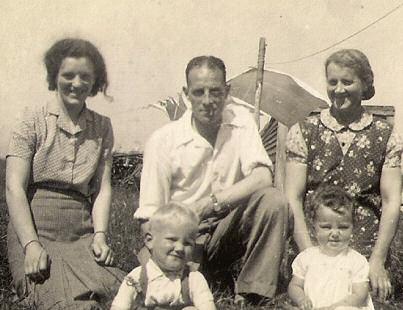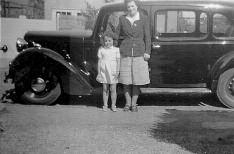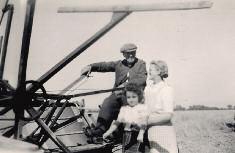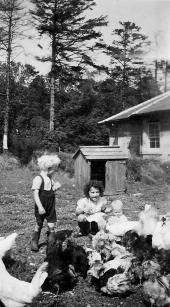Both my father’s family and my mother’s worked on farms in East Lothian. One of my grandads was a shepherd, the other was a foresman responsible for knocking on the doors of the other men at 5 o’clock to make sure the horses were corned and ready to start work at 6am.
My parents met during the second world war, when my dad was home on leave from the Navy. My mum, who was still in her teens, was working at Drem Post Office, where one of her duties was to cycle to surrounding farms with telegrams. It must have been a heart-breaking job when so often it was bad news she brought. In April 1942, when she was 18 and he was 22, they were married. Though dad had been invalided out of the Navy, he had then joined the Black Watch, so was soon off to war again. They had no home of their own, and mum, the middle one of seven children, lived at home with her parents. Of the three older ones, a brother and sister were also in the services, and another sister was married. The three younger ones were still at home.

The following year, I was born in the Vert in Haddington, and mum took me back to Lochhill, the farm between Drem and Longniddry where my grandad worked. With only a room and kitchen and an outside toilet it must have been difficult to find space for a new member of the family. Though I don’t remember that first home, I do have clear memories of the many other farms I got to know during my childhood years for, in turn, the wider family took us in to live with them; and both grandad and Danny, the shepherd grandad I never called by any other name, moved from farm to farm every few years. In fact, when I was only a few months old, granny and grandad moved to Spilmersford, where they had the cottage nearer to Pencaitland of a pair on the left hand side of the road to Saltoun. This had two bedrooms, one of which mum and I shared with her younger sister Alice. The other her brothers shared, and my grandparents slept in the living room.
Grandad worked on that farm for the next seven years, during which I often returned on holiday. I would go with him to the fields to watch him working with the horses. There is a photo of me, sitting on the binder. The Reilly family lived just down the road on the other side, and I used to play with their children. A favourite place was the woodland round the old quarry, which in spring was a mass of primroses and violets.
These were happy times, but there was also great sadness in that home, for Bill, the eldest of the family was killed in Burma in the last months of the war and Alice died in the flu epidemic of 1947.

Dad did come home from the war, and then he and mum and I went to stay with his folk at Eaglescairnie. Although I was only two, I remember it well. Dad drove a lorry for Guy of Aberlady, both granny and Danny worked on the farm, and mum looked after the house, the hens and me. Danny bred the most beautiful rabbits, which were kept near the house. I still have the tiny pair of mitts of silky-soft rabbit fur made for me then.
It must have been soon after this that Danny went to work at a farm just west of Gordon, in the Borders. As mum’s mother was ‘Spin Granny’ to me, so dad’s became ‘Gordon Granny’. They were always known to me by place name rather than surname. Places were very important to me, since almost all of my waking hours were spent outdoors.

We did not go to live in Gordon, but I often went to stay there, and loved that farm. Granny and Danny lived in the end cottage of a row facing down to the burn. The farm buildings lay on the other side of the burn, and I’d go there with Granny, who was the dairymaid. Before I was four, she had taught me how to milk a cow, and to make butter in the wooden churn. The farmer’s son and I became friends, and he would let me ride his little pony while he rode a horse.
For a while we lived at Camelaw near Innerwick with mum’s sister and her husband and son, who was just a fortnight older than I was. They had a smallholding, and also kept hens. I was allowed to feed them and help collect the eggs.
We then stayed at Seacliff with a relation of dad’s, who also had a son about my age. Their house was close to the burned-out mansion house, where we were forbidden to play, which made it all the more exciting. There was a wonderful bank of primroses near the beach, and a bluebell wood on the way to the Square, where there were other children we could play with.
The next move was to Balgone, where the Misses Grant-Suttie lived in part of the big house, which was very gloomy. Mum was their cook, and dad their chauffeur and handyman. This did not last long, and then with mum’s other sister and her husband we moved to Chesterhill, beyond Humbie, where the two men were employed as gardeners. We shared a cottage, but I was quite lonely there, for there were no other children to play with. The Jenny-wren nesting in the hedge by the back door became my pet. During the dreadful winter of 1946-47, I can remember helping to clear deep snow from the path to the drying green. In March, a fortnight after my fourth birthday came the awful news that my beloved Auntie Alice had died. All the roads were completely blocked, but my dad and my uncle walked all the way to Pencaitland through the snow. Dozens of men from the village had turned out to clear the road for the funeral.

When it was almost time for me to start school, we moved to North Berwick, where mum and dad had each gone briefly to the high school when her family lived at Athelstaneford and his at Whitekirk. Dad started work with Gilbert’s garage as a taxi driver, and mum got a job as a live-in cook/housekeeper. In her first place, Red Roses, she was very unhappy because her employers would not let her see me off to school from the front door, and I had to go round by Links Road and York Road to cross Dirleton Avenue. This upset me less, because there was freedom to explore as I always had done. There was a market garden and nursery where Abbey Court is now, then the bustling station, complete with goods yard and the welcoming coal office, with a cosy fire burning. At Nungate Cottages, there was one girl just a wee bit older than me who chummed me to school. We would go in the back gate, off Clifford Road, to the playground behind the building, which is now divided into the community centre and the nursery school.
Best of all, up the hill from the school, the Mains was still a working farm, with fields where the sports centre, Law Primary School, and Macnair Avenue were later built and, across Law Road, the traditional steading built of Law stone where Couper Avenue is now. My Gordon Granny’s sister was dairymaid at the Mains farm, and lived in the basement of the farmhouse. She and I became great friends.
The second family mum worked for lived at Westwood, also in Dirleton Avenue. They were much kinder, and I had the run of their huge garden, which extended back to May Terrace. It was here I learned to ride my first bike, which meant the three of us could cycle together – east to Seacliff, south to Redside, or west to Fenton Barns to visit various branches of the family and maybe, in the last case, go to the Parachute Café for ice cream.
My grandparents were still a very important part of my life, and during school holidays I’d go and stay with them, at either Spin or Gordon, then at Middlemains or Longyester, up beyond Gifford, where Danny was working. On the whole, I did not much care for dogs, having once been badly frightened by one; but I loved Danny’s collie, Jim. He was gentle, loyal and very intelligent, and I always felt safe with him.
Danny had two brothers who were also shepherds, and one of them lived at Benty Ha’, which we walked to through the fields and woods from Longyester. I don’t think there was a road to their house, which even at that time seemed very old-fashioned. I used to play with the children who lived along the road by Longyester School, and others who lived in the cottages past the farm. There was great excitement at shearing time, when the local men were joined by an itinerant team of shearers from New Zealand who worked at lightning speed, in the wooden shed at the end of the steading, next to the grieve’s house.
When I was eight, there were two wonderful changes in our lives. Mum and dad were at last allocated a council flat and had a home of their own for the first time, and my wee brother was born. Luckily, Danny continued working at Longyester and then at Yester for long enough for my brother to experience some of the joy which living on farms had given me.
Jean McEwan completed her schooling at North Berwick High School. After graduating from Glasgow University with an honours degree in economics, she went on to become a journalist.